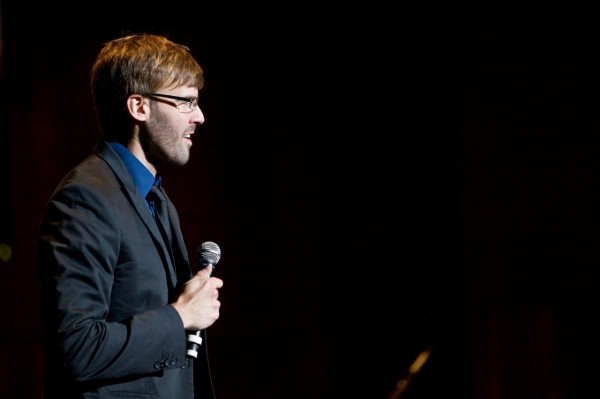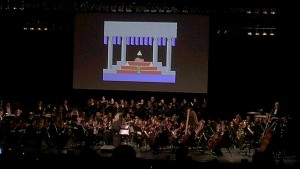
With E3 fading a little bit further into the background, there’s still a little bit more left in the tank in terms of coverage, and aside from the Game Museum, as promised, I actually got the chance to sit down with one of the three main gentlemen in charge of making the Zelda Symphony of the Goddesses show a reality.
Justin Clark: So, just as an introduction, tell us how you got started in the industry?
Jeron Moore: It really starts with following my passions. I started with Mario and Zelda as my first games. Later in life, when I was a teenager, my parents actually moved next door to a couple of video game developers. They had a hand in games like Commander Keen, Doom, Duke Nukem—
Justin: So, they worked for Id?
Jeron: No, it was Apogee, who was publishing for Id at the time, who eventually became 3D Realms. But at that point, my passion was already in filmmaking, directing and producing. That’s what I wanted to do with my life. I didn’t know at the time I was gonna get involved with video games, but I eventually went off to film school to perfect my craft. I’d always been a huge music guy, and marrying picture, sound, and music together to tell a story, and make an emotional impact, has always fascinated me.
Justin: How did this concert start?
Jeron: Well, I was a producer for Jason Michael Paul on Play!: A Video Game Symphony. We had a catalog of titles, one of which was Zelda. Jason had previously done the Dear Friends: Music From Final Fantasy shows, and then went on to make Distant Worlds happen. In the wake of stuff like that, and the Lord of the Rings symphony and Star Wars, Zelda was a thing that just needed to happen, but it didn’t. So, I bided my time on Play! and then got together with my buddy Chad [Seiter], who was the music director, put our heads together and pitched this idea to Jason, who allowed us the time and resources to put it together, and then the three of us took it to Nintendo.
Justin: What has working with Nintendo been like? They have a kind of history of being very strict with their music. I remember reading about everything Edgar Wright went through on Scott Pilgrim, just to be able to use that Fairy Fountain melody for, what, 20 seconds?
Jeron: (laughs) They’ve been wonderful! They’ve kinda taken us under their wing. They kinda think of us, in gaming terms, as kind of a third party developer. We’re like a Retro or a HAL Laboratories. Instead of making a game, they’ve licensed the music to us and worked very closely with us in order to put the show together and do it in a faithful way, one that’s respectful of the brand and honors [Koji] Kondo’s music and the way it should be done.
Justin: How much leeway do they give in terms of what music gets in or how the music can be arranged?
Jeron: It’s kind of a blank slate. Kondo-san basically allows us to pitch them ideas, and nothing’s been sent back with any major changes. Anything that comes back is usually…if we take any liberty with a melody, or explore it in a different way that might not adhere as closely to the original. And we’re not talking about changing the melody but how it might be harmonized. He’s very melody-centric, and if anything, his notes are always to get us to align us just a few pixels to the right to where it could be. And that’s been fun, because its helped us understand him as a creator even more. It’s been surreal getting to work with him and his team. It’s been a blessing to get his OK on the things we’re doing.
Justin: This tour is subtitled Second Quest, after Zelda 1’s New Game option. So, what can we expect that’s different from the first go around with this concert?
Jeron: I’d always wanted to call our second tour Second Quest. Just like Symphony of the Goddesses, there was simply no other option. We’re keeping all the things that you just couldn’t get rid of, like main themes and stuff, but we’ve cleared some of the material from last season, but brought some things that you might not expect. A lot of fans have been making requests, and we listened to those. Exploring those melodies in a different way this tour is very much in line with what Second Quest was in the games was: Exploring the same places, but experiencing new challenges.
 Justin: You occasionally hear about classically trained orchestras not responding well when handed material that they might consider is beneath their calibre. How have they been reacting to playing music from The Legend of Zelda, of all things?
Justin: You occasionally hear about classically trained orchestras not responding well when handed material that they might consider is beneath their calibre. How have they been reacting to playing music from The Legend of Zelda, of all things?
Jeron: Sometimes the orchestras are a little hesitant, because it’s not repertoire, it’s not what they consider to be the symphonic experience. But in addition, the music also isn’t easy. They’re actually rather challenging pieces. On the flip side, just like Dear Friends and Distant Worlds, it’s appealing to a whole different fanbase that may have never been to the symphony before. We’re introducing them to something they haven’t experienced.
Justin: When this is all said and done, are there other games/series you’d like to give the same treatment to?
Jeron: There’s quite a few. We’re not quite ready to talk about them, but I worked with another composer, a dear dear friend of mine, Jeremy Soule, and we’ve talked about doing his music for Elder Scrolls. He’s been talking on Facebook about it, and there seems to be some excitement about it. But there’s plenty of possibilities out there.
Justin: Favorite film score?
Jeron: Oh wow. Well, I can tell you favorite film composer: Jerry Goldsmith. Favorite film score from him would probably be Total Recall, or Rudy. I really liked The Mummy.
Justin: That score is so underrated.
Jeron: It really is. The film is one thing, but the music? Jerry had a habit of scoring films that weren’t always highly regarded, but always made 1000% better because of the music.
Justin: Favorite Zelda?
Jeron: I have an affinity for the first game, for what it established, the foundation. Big Wind Waker fan, but as a culmination of all the elements, Twilight Princess resonated with me in a lot of ways. I just really enjoyed it. it was dark, and pretty, it had a lot of personality, the characters had a lot of depth, Hyrule felt a lot bigger than any iteration prior. The classic story was intact with a new spin.
Justin: I love how I’ve gotten into this argument a dozen times this week, and no one ever says Zelda II.
Jeron: It’s an interesting title, and the music was fantastic! Season One, we had the dungeon theme as part of the show, and I loved pointing out to people that music did NOT come from Smash Brothers! I played that one feverishly when I was young. Somehow, I even beat it!
Justin: It’s weird, it took me years to beat Zelda 1, but one dedicated summer to beat Zelda II. I think it was just spite. I didn’t want that game to win. Very lastly, what are you playing now?
Jeron: At this point, I’ve been so entrenched in making Second Quest happen, my gaming routine has kinda gotten off course. I went through Bioshock Infinite. That was a lot of fun. I’m tinkering with Castlevania: Mirror of Fate and Fire Emblem on the 3DS. I need to pick up The Last Of Us. I kept hearing about that, and it came out, and I’m going “Oh my God I need this game.”
Justin: It actually doesn’t come out till Friday.
Jeron: Awesome. Now I don’t feel so bad! I see all my friends posting pictures of shrink wrapped copies on Facebook. And it’s probably all my friends at Naughty Dog and I didn’t even realize it.
